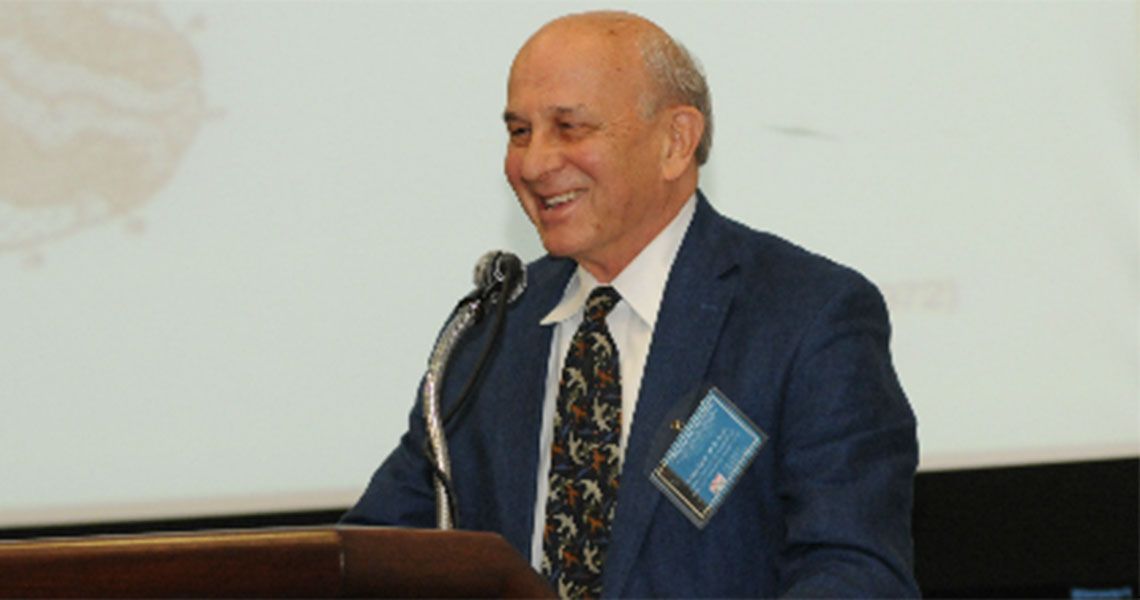Neuroscientists and students from across the country gathered in the Grand Ballroom of the George Washington University’s Cloyd Heck Marvin Center May 2 for the GW Institute for Neuroscience (GWIN) 3rd Annual Neuroscience Symposium, hosted in coordination with GW’s School of Medicine and Health Sciences (SMHS).
The day-long symposium, “Cortical Development and Epilepsy: From Bench to Bedside,” was co-sponsored by Citizens United for Research in Epilepsy (CURE). According to Anthony-Samuel LaMantia, Ph.D., professor of pharmacology and physiology at SMHS and director of GWIN, the symposium is “an acknowledgement of our commitment to continued progress in neuroscience at GW, as well as a celebration of remarkable progress in understanding basic mechanisms of brain development and function, and their role in serious brain diseases.”
The morning session was chaired by Vittorio Gallo, Ph.D., professor of pharmacology and physiology at SMHS and Wolf-Pack Professor of Neuroscience at Children’s National Medical Center. Speakers included Judy Liu, M.D., Ph.D. assistant professor of pharmacology and physiology at SMHS; Courtney Wallin, a doctoral student in the department of psychology at SMHS; Bethany Hoegberg, a doctoral student in the department of pharmacology and physiology at SMHS; and Christopher A. Walsh, M.D., Ph.D., Bullard Professor of Pediatrics and Neurology at Harvard Medical School and chief of the Division of Genetics at Children’s Hospital, Boston. The topics covered ranged from molecular motors in diseases of brain development including epilepsy, analysis of cellular and genetic heterogeneity in the developing human cerebral cortex, to sex differences in response to chronic prenatal nicotine exposure in rats.
Gardiner Lapham, chair-elect of CURE, closed the morning session with a talk titled “Why This Matters So Much.” Lapham, whose background is in nursing and public health, lost her four-year-old son, Henry, in 2008 to Sudden Unexplained Death in Epilepsy (SUDEP). She emphasized the potential of recent advances in neuroscience to transform and save lives, especially in light of increased recognition of the public health implications of the many and varied syndromes that make up the “epilepsies.”
The symposium’s afternoon session was chaired by Sally Moody, Ph.D., professor of anatomy and regenerative biology at SMHS. Speakers included LaMantia, who discussed developmental pathogenesis in DiGeorge/22q11 deletion syndrome; Timothy Hammond and Heather Jameson, doctoral students in the program in molecular medicine at SMHS; and Frances Jensen, M.D., chair of neurology at the University of Pennsylvania’s Perelman School of Medicine. The speakers covered topics such as the role of oxytocin neurons in obstructive sleep apnea mediated cardiovascular disease and shared mechanisms contributing to epileptogenesis and epilepsy co-morbidities.
The symposium was closed by Pasko Rakic, M.D., Sc.D., Duberg Professor and Chair of the Department of Neurobiology, and director of the Kavli Institute for Neuroscience at Yale University School of Medicine. In his plenary talk, “Principles and Mechanisms of Neuronal Migration: Relevance to Evolution, Development, and Brain Disorders,” Rakic described his research team’s strategy of using a variety of in vitro and in vivo assays in mice, macaque monkeys, and humans to learn from the similarities and differences in cellular mechanisms of cortical expansion and elaboration.
“When I entered the field and somebody wanted to organize a symposium, I would be the only speaker because there was nobody working in the field,” said Rakic, who served as LaMantia’s dissertation mentor in the mid-1980s. “Things have certainly changed,” he said.



